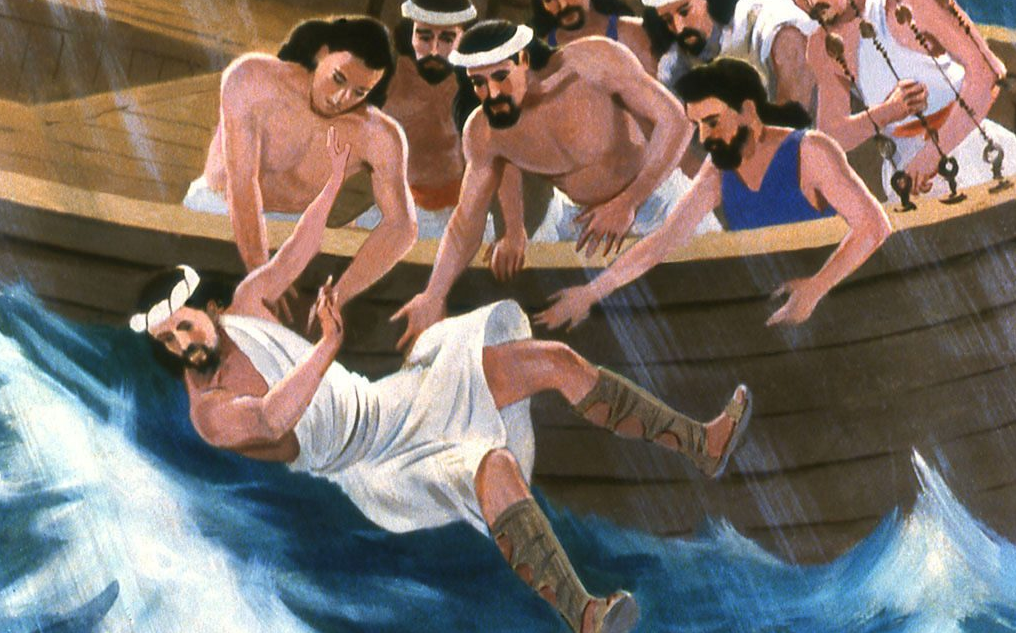Church Talk: Running away from God
Friday 17 March 2023 | Written by Supplied | Published in Church Talk, Features

They picked up Jonah and threw him into the sea, and the sea ceased from its raging. inspirationalchristians.org/23031612
In our reading of today, we are reminded of a man called Jonah. He was one of the minor prophets whom God had called. The word of the Lord, God came to Jonah, the son of Amittai, “Arise, go to Nineveh, that great city, and cry out against it; for their wickedness has come up before Me.” By Reverend Vaka Ngaro of Cook Islands Christian Church.
God spoke to Jonah in His own unique and powerful way and He told Jonah to do two things. First, he must go to Nineveh; second, he must cry out against it – that is, rebuke them for their sin and call them to repentance.
The city of Nineveh was the capital of the Assyrian Empire and was a large and prominent city in its day. It was not a city of Israel at all; God called Jonah to go to a pagan, Gentile city and call them to repentance. Ancient historians say that Nineveh was the foremost city in the world at that time. It was the large, important capital of a dominating empire surely an intimidating place to go. For their wickedness has come up before Me, says the Lord. God wanted Jonah to go because He saw their wickedness. None of man’s wickedness is hidden before God. He sees it all, and it may come to a point where it demands the specific warning and judgment of God.
But Jonah arose to flee to Tarshish from the presence of the Lord. He went down to Joppa, and found a ship going to Tarshish; so he paid the fare, and went down into it, to go with them to Tarshish. He didn’t want to do what God told him to do. Several reasons for this have been suggested. It may have been because he was given a difficult job to do. Jonah had every reason to expect that at the very best, he would be mocked and treated as a fool. Jonah wanted to go as far as he could to escape God’s presence, but this was a futile attempt.
To flee to Tarshish was thought to be towards the end of the earth and in the Bible, it is always associated with ships. Nineveh was to the east of Israel and Tarshish was about as far as you could go west, on the coast of what is today Spain, past the straits of Gibraltar. In heading for Tarshish, Jonah intended to get as far away from Nineveh, and the calling of God to go there, as he possibly could. Found a ship going to Tarshish: We don’t doubt that Jonah felt like going to Tarshish. There was an impulse within him driving him there, but it was a dangerous impulse. We may take Jonah as an example of the danger of doing things solely on the basis of mere impulse or feelings.
So, Jonah paid his fare, perhaps, he even felt that the Lord provided the money for his fare! This shows the danger of being guided by circumstances. It is very easy to make up a providence when you want to do so. Nevertheless, when you run away from the Lord, you never get to where you are going and you always pay your own fare. But the Lord sent out a great wind on the sea, and there was a mighty tempest and the ship was about to be broken up. It was the Lord who stirred up the storm. The sailors of the ship seek their superstitious gods. But Jonah had gone down into the lowest parts of the ship, had lain down, and was fast asleep. So the captain came to him, and said to him – “What do you mean, sleeper? Arise, call on your God; perhaps your God will consider us, so that we may not perish”. Jonah then realised that he was the cause of this calamity.
Jonah tells them about who he is and what he has done. He said to them, I am a Hebrew; and I fear the Lord, the God of heaven, who made the sea and the dry land. Jonah knew the truth about God, even though his claim to fear the Lord was only partly true because he was running from the Lord. Jonah, at his own request, asks to be thrown into the sea, and the sailors reluctantly agree.
So they picked up Jonah and threw him into the sea, and the sea ceased from its raging. Then the men feared the Lord exceedingly, and offered a sacrifice to the Lord and took vows.












































